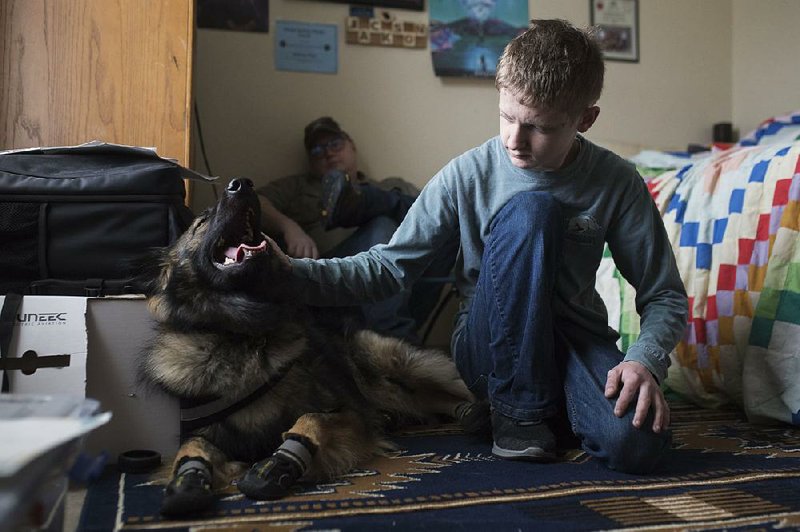Jackson Fine walked into the Siloam Springs Walmart that day as he has countless times, with his service dog, Jasmine, at his side.
On this occasion, though, the pair encountered another dog as its owner was leaving the store. The dog began barking ferociously and lunging at Jasmine, who placed herself between the dog and 16-year-old Jackson, who has autism. Had its owner not been able to keep a grasp on the leash and pull the dog back, Jasmine could have been injured, or even killed.
Jackson's dad, Anthony Fine, said Jasmine performed exactly as she was trained. It was the other dog, barking and charging at people, that posed a safety problem, he said, and shouldn't have been in a store.
Walmart Inc.'s policy of allowing only service animals in its stores is not new, but the blue-and-white signs at store entrances stating this policy are. Service-dog trainers and handlers say they appreciate the signs because nonservice dogs in the stores, as well as in other businesses, pose a threat to legitimate service dogs and their handlers.
They say businesses need to be more vigilant in enforcing their policies, but the public especially needs to be better informed about the reason the policies exist and the importance of complying with them.
A Walmart spokesman said the signs were distributed to stores nationwide in October, and should have been installed right away. Some people may just now be noticing them, he said.
Tim Franks, owner of On Command Canine Training Academy in Joplin, Mo., takes service dogs and their handlers to public places such as Walmart, Home Depot and Lowe's as part of their training. Franks said the problem in these businesses isn't their service-dog policies -- it's the people who ignore them and bring in their emotional-support dog or family pet, trying to pass it off as a service dog.
A legitimate service dog has been preparing for its role since it was 8 weeks old, Franks said, and gets a minimum of 180 hours of training to work with its handler.
"The service dog is in training that's so intense that he has the ability to overlook distractions," Franks said. "He doesn't demand affection. He has the ability to control his [stimulus response] because he's had so many hours of training in the field."
On the other hand, he said, an emotional support pet requires no training. Even therapy dogs, who visit places like hospitals, libraries and nursing homes, get at most 12 weeks of training. "Those dogs don't have the hours, the intense training of holding themselves back in public places," that a service dog has, Franks said.
"And Walmart has found that out with the multiple complaints they've gotten by allowing dogs of all shapes and sizes and registrations and certifications in their stores. ... We've had our own service dogs attacked in Walmart while we were in there working with legitimate service dogs, attacked by family pet dogs that somebody was trying to shove off as" service dogs.
Tresa Oldham of Bella Vista said her 18-year-old daughter, Karolynn, had an upsetting experience in a Walmart store when a dog in a shopper's purse spotted Karolynn's service dog, Chip, and started barking. The store was packed on a Sunday afternoon, and the little dog's barking drew a crowd.
Karolynn, who has post traumatic stress disorder as well as an intellectual disability, became extremely anxious from all the attention and commotion. Her mom took her into a back room to allow her to calm down. As soon as Karolynn felt better, they left the store.
That wasn't the first distressing encounter with a nonservice dog, Oldham said, "but it's the most serious one."
"You're putting a child in harm's way," Oldham said of people who don't control their dogs in public places. "You're putting them in danger because of your actions." She says education is the key to avoiding dangerous situations.
Walmart's service-dog policy, posted on its corporate website, states the company is "committed to making reasonable modifications to its policies, practices, and procedures" to allow people with disabilities to use service animals in its stores.
"Service animals play an important role in insuring the independence of people with disabilities, and it is therefore our policy to welcome into our stores any animal that is individually trained to assist a person with a disability," the policy states.
The policy aligns with the Americans With Disabilities Act, which states that any business, nonprofit organization or state or local government entity that serves the public must "generally" allow service dogs to accompany people with disabilities into all areas of the facility where the public is allowed to go.
By law, a person who enters a business or other public establishment with a service dog may only be asked two questions: Is that a service dog, and what services does it provide for you.
Franks said it is a misdemeanor in most states for a person to pretend to have a disability, put a vest on the family dog and try to pass it off as a service dog, just to be able to take it along wherever they go. Yet it happens all the time, all over the country, he said.
The act is intended to protect the rights of people with disabilities who use a service dog, Franks said, not the rights of the dog, as some people may think. The law grants the right of access to public places to people with disabilities who use medical equipment to help mitigate their disability.
"So it's not that the dog has the right to go into Walmart," he said. "The right comes with the person who has the disability, and the dog just happens to be the medical device that they use."
On the other hand, Franks said, businesses have rights also. If a service dog is clearly not under the control of its handler, or poses a public health hazard such as scratching and shedding hair and fleas, the business owner or manager has the right to ask the dog's handler to remove it.
Franks, who has placed service dogs throughout the United States, also works with businesses to help them develop service dog policies and to educate employees on how to stay on the right side of the Americans with Disabilities Act while screening out the "fake" service animals people try to bring in.
"It's up to you as a store owner to know if someone's pulling one over on you," he said.
No business wants to run afoul of the laws protecting the rights of disabled people, Franks said, but there also are liability issues at stake if a nonservice dog attacks a service dog and injures or kills it, or if someone gets bitten trying to break up a dogfight.
A serious injury could end a service dog's career, and, as Franks points out, the dogs aren't cheap. They "range anywhere from $15,000 to $30,000," he said.
For Jackson and Karolynn, though, and their families, a service dog is priceless.
Jasmine, a long-haired German shepherd, accompanies Jackson to Siloam Springs High School, and Chip, a black American Labrador retriever, will "graduate" with Karolynn from Bentonville High School in May. Not only will Chip walk across the stage with Karolynn as she receives her diploma, but he'll be decked out in a matching cap and gown.
SundayMonday Business on 02/03/2019

